Choosing The Right Pool Filter For Clean Water
Imagine stepping into your pool on a hot summer day, the water sparkling and inviting. The key to maintaining such pristine conditions is often overlooked but vitally important—the pool filter. Choosing the right pool filter ensures that your pool stays clean, safe, and ready for a dip at any moment. Keeping your pool water clean isn't just about aesthetics; it's about maintaining a healthy environment for swimmers. In this blog post, we’ll explore the different types of pool filters, factors to consider when choosing one, and best practices for maintenance. By the end, you’ll be armed with the knowledge to make the best choice for your pool.
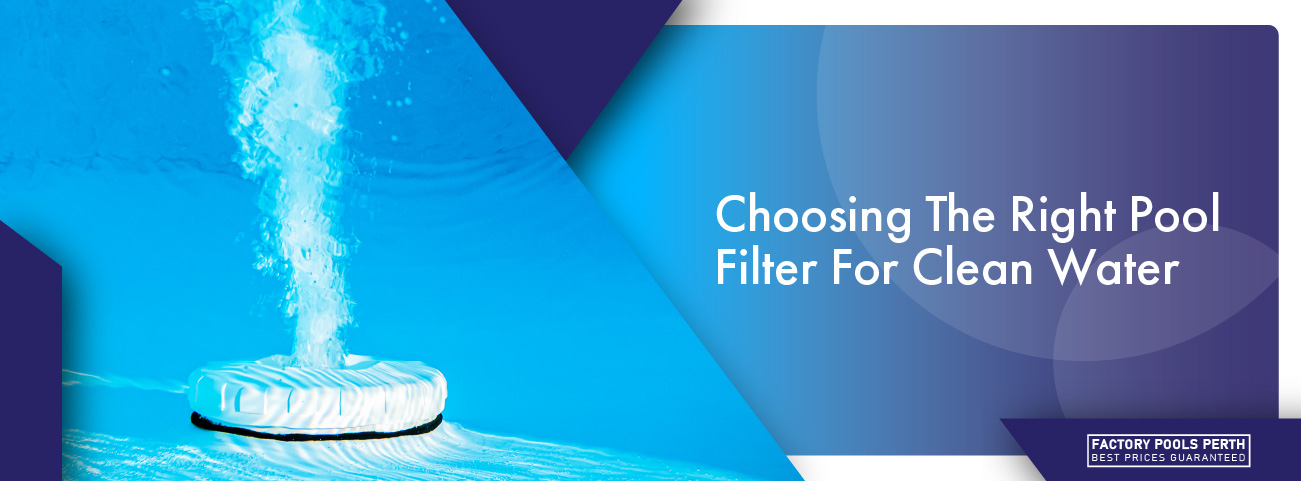
Types of Pool Filters
Sand Filters
Sand filters are one of the most common types of filters used in pools. They work by pushing water through a bed of sand, which traps particles and debris.
Pros: Sand filters are relatively inexpensive and easy to maintain. They have been a reliable choice for many pool owners due to their simplicity and durability.
Cons: However, sand filters are not as efficient as other types in capturing very small particles. They also require backwashing, which can waste a significant amount of water.
Cartridge Filters
Cartridge filters use a replaceable, pleated cartridge to filter the water. The larger surface area of the cartridge allows for better filtration and longer periods between cleanings.
Pros: These filters are more efficient than sand filters, capturing smaller particles. They require less water for maintenance as they don’t need to be backwashed.
Cons: Cartridge filters can be more expensive initially, and the cartridges need to be replaced periodically, adding to the long-term cost.
DE Filters
DE (Diatomaceous Earth) filters offer the highest level of filtration, using a powder made from fossilized diatoms.
Pros: DE filters can capture particles as small as 3-5 microns, making them the most effective at keeping water crystal clear. They are ideal for pool owners looking for the highest quality filtration.
Cons: These filters are the most expensive and require the most maintenance. Handling DE powder can be messy, and the filter grids need to be cleaned and recoated with DE powder regularly.
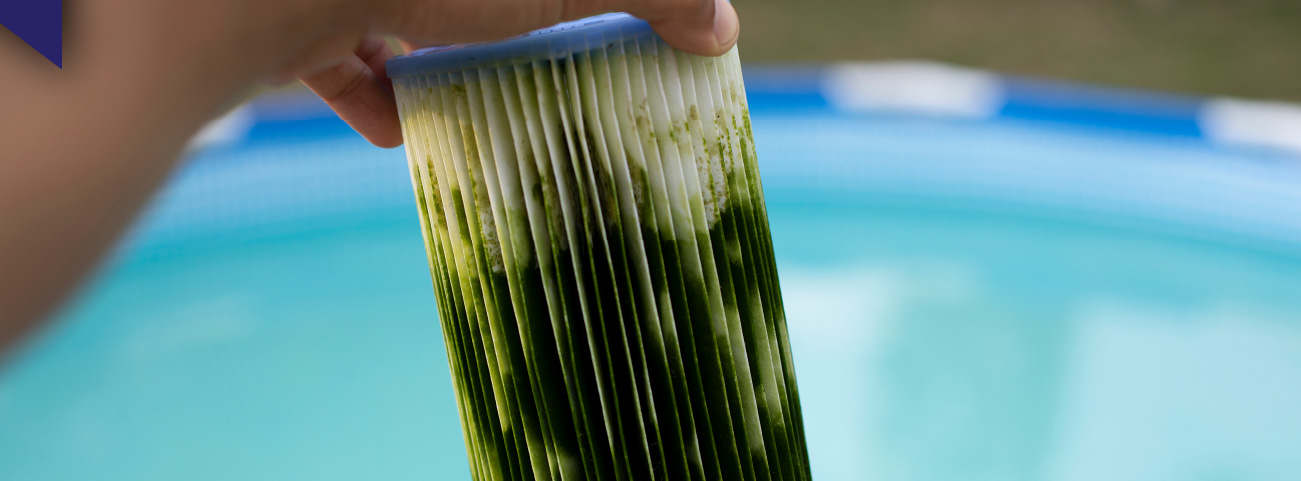
Factors to Consider When Choosing a Pool Filter
Pool Size and Water Flow Rates
One of the first factors to consider is the size of your pool and the flow rate of your pump. Larger pools will require filters with higher flow rates to ensure all the water is adequately filtered. Check the filter’s specifications to ensure it can handle your pool’s volume.
Maintenance Requirements and Costs Over Time
Different filters have varying maintenance needs and associated costs. Sand filters require regular backwashing, cartridge filters need periodic cartridge replacements, and DE filters need frequent cleaning and re-coating. Factor in both the time and financial cost when making your decision.
Environmental Factors
The environment surrounding your pool can impact its cleanliness. If your pool is located near trees or in a dusty area, it may require more frequent filtration. Additionally, if you live in an area with heavy rainfall, you might need a filter that can handle larger debris quickly.
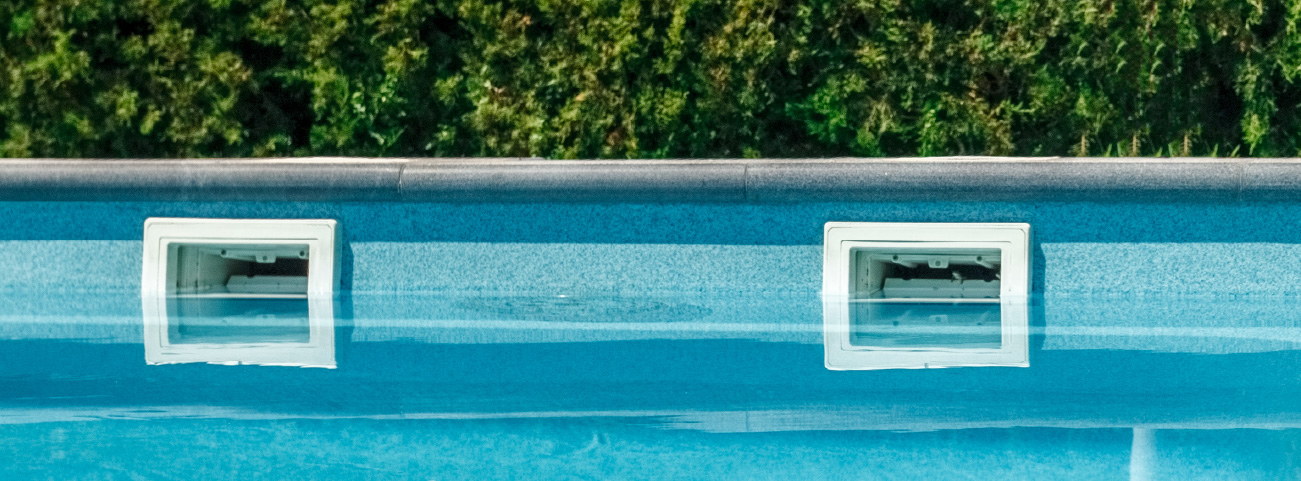
Best Practices for Filter Maintenance
Regular Cleaning and Backwashing
Regular maintenance is crucial for keeping your pool filter working efficiently and ensuring clean, clear water. For sand filters, this means backwashing every few weeks to remove trapped debris and restore proper flow. Cartridge filters should be hosed down to remove surface dirt and soaked in a filter cleaner every few months to dissolve oils and deeper contaminants. DE filters require periodic backwashing to clean the grids and adding new DE powder to maintain their filtering capacity. Neglecting these steps can lead to inefficient filtration and potential damage to your pool equipment.
Signs Indicating Maintenance or Replacement
Knowing when your filter needs attention can prevent bigger issues down the line and help maintain optimal pool health. If you notice cloudy water, it could indicate that your filter is not effectively removing particles. Higher than usual filter pressure might suggest that the filter is clogged and needs cleaning. Reduced water flow can be a sign that the filter media is saturated with debris. Regularly monitoring for these signs and addressing them promptly can extend the life of your filter and keep your pool in top condition.
Choosing the Right Filter for Your Pool
Step-by-Step Guide
- Assess Your Pool’s Needs: Consider the size of your pool, the water flow rate, and environmental factors such as the amount of debris and sunlight exposure. These elements will influence the type of filter that best suits your pool.
- Evaluate Your Maintenance Preferences: Determine how much time and effort you’re willing to invest in filter maintenance. Some filters require frequent cleaning and replacement, while others are more low-maintenance but may come with a higher initial cost.
- Compare Long-Term Costs: Look beyond the initial purchase price of the filter and consider the ongoing maintenance costs, including replacement parts and energy consumption. A more expensive filter might save you money in the long run if it requires less frequent maintenance.
- Seek Advice: Consult with other pool owners or professionals to get valuable insights and recommendations. They can provide firsthand experiences and tips on which filters perform best under various conditions and how to maximize efficiency and longevity.
Choosing the right pool filter is essential for maintaining a clean and inviting pool. There are several types of filters available, including sand, cartridge, and diatomaceous earth (DE) filters, each with its own advantages and disadvantages. By understanding these options, considering key factors such as the size of your pool, the frequency of use, and your budget, and following best practices for maintenance, you can ensure your pool remains a perfect oasis. Regularly checking and cleaning your filter, replacing it as needed, and monitoring the pool’s chemical balance are critical steps. Remember, the right filter can save you time and money while providing peace of mind knowing your pool is in top condition, ready for you and your family to enjoy. Investing in the proper filtration system will enhance your pool experience and prolong the life of your pool equipment.
Choosing The Right Pool Filter For Clean Water
Imagine stepping into your pool on a hot summer day, the water sparkling and inviting. The key to maintaining such pristine conditions is often overlooked but vitally important—the pool filter. Choosing the right pool filter ensures that your pool stays clean, safe, and ready for a dip at any moment. Keeping your pool water clean isn't just about aesthetics; it's about maintaining a healthy environment for swimmers. In this blog post, we’ll explore the different types of pool filters, factors to consider when choosing one, and best practices for maintenance. By the end, you’ll be armed with the knowledge to make the best choice for your pool.
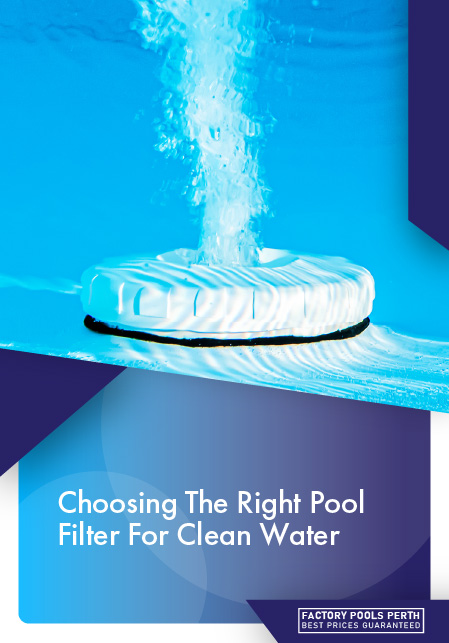
Types of Pool Filters
Sand Filters
Sand filters are one of the most common types of filters used in pools. They work by pushing water through a bed of sand, which traps particles and debris.
Pros: Sand filters are relatively inexpensive and easy to maintain. They have been a reliable choice for many pool owners due to their simplicity and durability.
Cons: However, sand filters are not as efficient as other types in capturing very small particles. They also require backwashing, which can waste a significant amount of water.
Cartridge Filters
Cartridge filters use a replaceable, pleated cartridge to filter the water. The larger surface area of the cartridge allows for better filtration and longer periods between cleanings.
Pros: These filters are more efficient than sand filters, capturing smaller particles. They require less water for maintenance as they don’t need to be backwashed.
Cons: Cartridge filters can be more expensive initially, and the cartridges need to be replaced periodically, adding to the long-term cost.
DE Filters
DE (Diatomaceous Earth) filters offer the highest level of filtration, using a powder made from fossilized diatoms.
Pros: DE filters can capture particles as small as 3-5 microns, making them the most effective at keeping water crystal clear. They are ideal for pool owners looking for the highest quality filtration.
Cons: These filters are the most expensive and require the most maintenance. Handling DE powder can be messy, and the filter grids need to be cleaned and recoated with DE powder regularly.
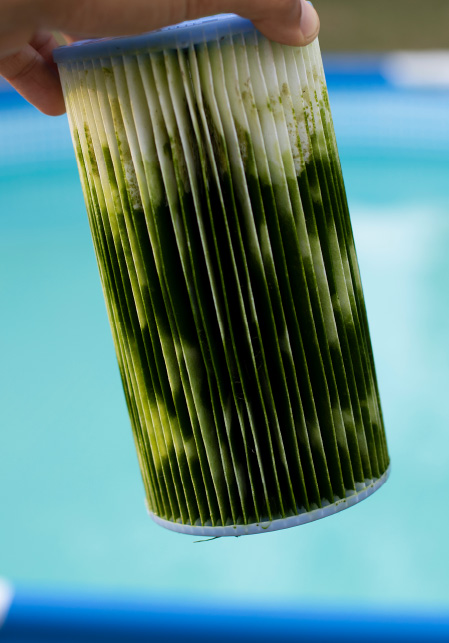
Factors to Consider When Choosing a Pool Filter
Pool Size and Water Flow Rates
One of the first factors to consider is the size of your pool and the flow rate of your pump. Larger pools will require filters with higher flow rates to ensure all the water is adequately filtered. Check the filter’s specifications to ensure it can handle your pool’s volume.
Maintenance Requirements and Costs Over Time
Different filters have varying maintenance needs and associated costs. Sand filters require regular backwashing, cartridge filters need periodic cartridge replacements, and DE filters need frequent cleaning and re-coating. Factor in both the time and financial cost when making your decision.
Environmental Factors
The environment surrounding your pool can impact its cleanliness. If your pool is located near trees or in a dusty area, it may require more frequent filtration. Additionally, if you live in an area with heavy rainfall, you might need a filter that can handle larger debris quickly.
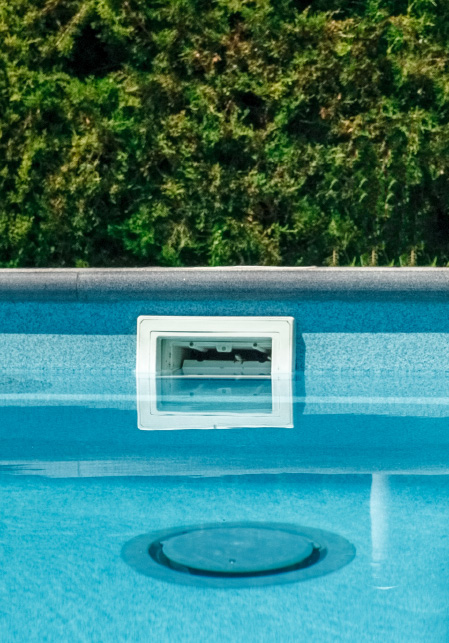
Best Practices for Filter Maintenance
Regular Cleaning and Backwashing
Regular maintenance is crucial for keeping your pool filter working efficiently and ensuring clean, clear water. For sand filters, this means backwashing every few weeks to remove trapped debris and restore proper flow. Cartridge filters should be hosed down to remove surface dirt and soaked in a filter cleaner every few months to dissolve oils and deeper contaminants. DE filters require periodic backwashing to clean the grids and adding new DE powder to maintain their filtering capacity. Neglecting these steps can lead to inefficient filtration and potential damage to your pool equipment.
Signs Indicating Maintenance or Replacement
Knowing when your filter needs attention can prevent bigger issues down the line and help maintain optimal pool health. If you notice cloudy water, it could indicate that your filter is not effectively removing particles. Higher than usual filter pressure might suggest that the filter is clogged and needs cleaning. Reduced water flow can be a sign that the filter media is saturated with debris. Regularly monitoring for these signs and addressing them promptly can extend the life of your filter and keep your pool in top condition.
Choosing the Right Filter for Your Pool
Step-by-Step Guide
- Assess Your Pool’s Needs: Consider the size of your pool, the water flow rate, and environmental factors such as the amount of debris and sunlight exposure. These elements will influence the type of filter that best suits your pool.
- Evaluate Your Maintenance Preferences: Determine how much time and effort you’re willing to invest in filter maintenance. Some filters require frequent cleaning and replacement, while others are more low-maintenance but may come with a higher initial cost.
- Compare Long-Term Costs: Look beyond the initial purchase price of the filter and consider the ongoing maintenance costs, including replacement parts and energy consumption. A more expensive filter might save you money in the long run if it requires less frequent maintenance.
- Seek Advice: Consult with other pool owners or professionals to get valuable insights and recommendations. They can provide firsthand experiences and tips on which filters perform best under various conditions and how to maximize efficiency and longevity.
Choosing the right pool filter is essential for maintaining a clean and inviting pool. There are several types of filters available, including sand, cartridge, and diatomaceous earth (DE) filters, each with its own advantages and disadvantages. By understanding these options, considering key factors such as the size of your pool, the frequency of use, and your budget, and following best practices for maintenance, you can ensure your pool remains a perfect oasis. Regularly checking and cleaning your filter, replacing it as needed, and monitoring the pool’s chemical balance are critical steps. Remember, the right filter can save you time and money while providing peace of mind knowing your pool is in top condition, ready for you and your family to enjoy. Investing in the proper filtration system will enhance your pool experience and prolong the life of your pool equipment.




